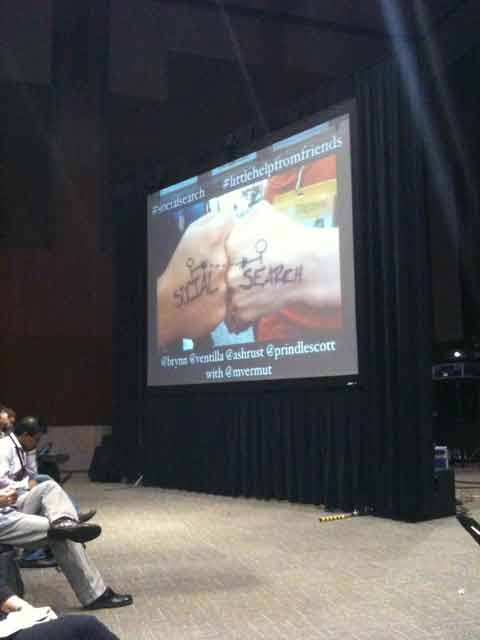 Brynn Evans, Max Ventilla, Marc Vermut, Scott Prindle and Ash Rust participated in the panel, “Social Search: A Little Help from My Friends.” The session started off with each panelists giving a little background information about their particular area of expertise in social searching. The panelists threw out phrases such as ‘gathering trends from a crowd’ and ‘friend-filtered social search’ when giving the audience an initial perception of what social searching really is. The panel continued with a basic observation: you have two strategies when searching; ask the network or embark on the task alone. When designing a search space, the challenge is to understand these two strategies, as well as to design for objective questions (When is Labor Day this year?) and subjective questions (Where should I take my girlfriend to dinner?).
Brynn Evans, Max Ventilla, Marc Vermut, Scott Prindle and Ash Rust participated in the panel, “Social Search: A Little Help from My Friends.” The session started off with each panelists giving a little background information about their particular area of expertise in social searching. The panelists threw out phrases such as ‘gathering trends from a crowd’ and ‘friend-filtered social search’ when giving the audience an initial perception of what social searching really is. The panel continued with a basic observation: you have two strategies when searching; ask the network or embark on the task alone. When designing a search space, the challenge is to understand these two strategies, as well as to design for objective questions (When is Labor Day this year?) and subjective questions (Where should I take my girlfriend to dinner?).
Ventilla discussed how most people turn to their friends when asking subjective questions, but that asking friends can come at a price. For example, your circle of friends can be unreliable. With social searching, you can tap into a vast resource of knowledge from people that you don’t know. Through this interaction, people are able to A) get an answer, B) seek multiple responses/opinions, C) Answer questions themselves and D) connect with the people who answer their questions.
 Rust explained how realtime searches track and digest content from countless numbers of social networks. This content is then used to answer questions someone might ask. Evans suggested “think[ing] of search as a process over time.” Rust used the death of Michael Jackson as an example of effective social searching. When Jackson died, you couldn’t get answers from traditional news sites. People turned to social networks and social search sites to get answers. From montages about Jackson’s life to what was going to happen to his children, these social searches were able to provide answers. Prindle also discussed several case studies that exemplified what he believes social searching really is. For an example, check out the Twelpforce video at the bottom of the post (example shown during panel).
Rust explained how realtime searches track and digest content from countless numbers of social networks. This content is then used to answer questions someone might ask. Evans suggested “think[ing] of search as a process over time.” Rust used the death of Michael Jackson as an example of effective social searching. When Jackson died, you couldn’t get answers from traditional news sites. People turned to social networks and social search sites to get answers. From montages about Jackson’s life to what was going to happen to his children, these social searches were able to provide answers. Prindle also discussed several case studies that exemplified what he believes social searching really is. For an example, check out the Twelpforce video at the bottom of the post (example shown during panel).
Prindle summed up the basic model of social searching by saying “Give customers something good to talk about in social media, and they will talk.” The overall message was simple: take what people are talking about, and what people are asking questions about, and connect the two.
This exemplifies how a person can put out a question on a social network, and get a huge number of responses from a variety of people.

Permalink
Getting more feedback and responses may allow the searcher to pick and choose which response they feel is correct, but I would feel more confident in the answer if the person added a link to a credible source I could look at for further verification.
Did the panel favor Twitter as the best medium to conduct a social search?
Permalink
I love how social networking has changed everyones lives, from how we communicate to how fast we can communicate. I love that people all over the world have these great platforms to post on.
No matter how many people say they hate Twitter, it has changed our lives. Not only can we post as often as we want, but we even found new ways to engage with people all over the world. It amazes me that we are even breaking news faster than some news outlets. Crazy! What do you think the future will have in store for news and how fast we get it?
Permalink
That’s actually a new phrase for me, “social search.” During Mass Comm week I remember a panel saying how news outlets were using social media to find sources and ideas for stories on what interests the audience. However, they said those same news sources could not report on statements from citizen journalism without first checking out the facts for themselves.
The example of Michael Jackson’s death and how people had to social search for immediate updates on events makes me wonder how the audience can learn to be more critical and differentiate between truth and false. Information, whether true or otherwise spreads like wildfire. I agree with Kinsey in needing a credible source, and the more feedback a searcher gets may help to find the truth.
Permalink
Social media and social searches are the easiest forms of informal polling. “Does anyone know someone who works for Whole Foods?” “Do any students have a sibling overseas at war?” Tweet it, put it as your status on Facebook, whatever — you’re sure to find someone who knows someone that has an answer or can provide further insight.
A great example of using social media to find info was a few weeks back when a a man flew a plane into a federal office building in Northwest Austin. With no direct connection to the people there or those affected, The University Star sent tweets asking if any students had family members or friends working in or around the building. We got some bites, leading to interviews with first accounts of the event.
Permalink
it is just mind blowing to see how social media has changed the way we communicate. Just almost every day in class i see people constantly checking their facebook mainly its almost like the new way of passing notes in class! haha
What do you think is next in the world of social media? And do you think doing social media so much is why the new generations have started texting more now then calling each other, and basically just eliminating face to face conversations??
Permalink
The way social media has shaped and is continuing to shape our lives is mind blowing. Through social media outlets like Twitter and Facebook, you are constantly connected to the world. Many people, like myself, rely on Twitter for breaking news stories. I remember a few weeks ago during the Chilean earthquake, I was seeing new tweets every couple minutes from @breakingnews about aftershocks, the death toll and directing people to a site where they could find survivors.
Social media is constantly changing and growing every second of every day. Where is it headed next? Will it become our only source for news and communication? Do we rely too much on social media?